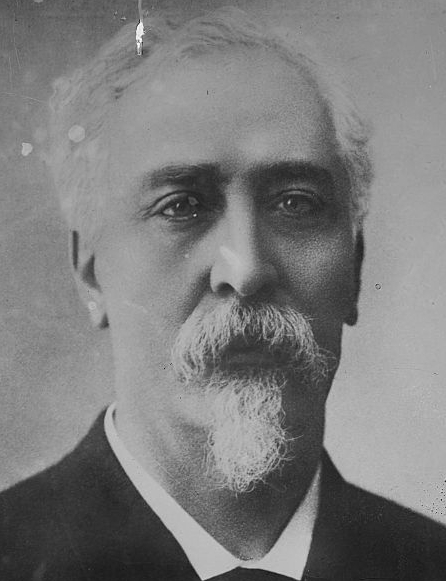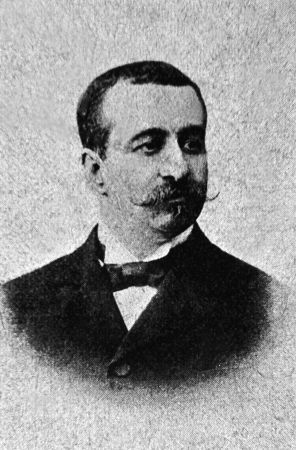|
Stephanos Dragoumis
Stefanos Dragoumis ( el, Στέφανος Δραγούμης; 1842September 17, 1923) was a judge, writer and the Prime Minister of Greece from January to October 1910. He was the father of Ion Dragoumis. Early years Dragoumis was born in Athens. His grandfather, Markos Dragoumis (1770–1854), who was born in a prominent Greek family from Vogatsiko in the present Kastoria regional unit, had been a member of the 1814–1821 revolutionary Filiki Eteria, while his father Nikolaos Dragoumis was secretary of Ioannis Kapodistrias. Born in Athens in 1842, Dragoumis studied law at the University of Paris and became a judge. Political career He became Secretary-General of the Ministry of Justice and was very active politically. He was later elected a member of Parliament and served as Minister of Foreign Affairs, Minister of Justice and Minister of the Interior. He was also active in the Macedonian Struggle. The organization ''Macedonian Committee'' was formed in 1904 by Stephanos Dra ... [...More Info...] [...Related Items...] OR: [Wikipedia] [Google] [Baidu] |
Stephanos Dragoumis
Stefanos Dragoumis ( el, Στέφανος Δραγούμης; 1842September 17, 1923) was a judge, writer and the Prime Minister of Greece from January to October 1910. He was the father of Ion Dragoumis. Early years Dragoumis was born in Athens. His grandfather, Markos Dragoumis (1770–1854), who was born in a prominent Greek family from Vogatsiko in the present Kastoria regional unit, had been a member of the 1814–1821 revolutionary Filiki Eteria, while his father Nikolaos Dragoumis was secretary of Ioannis Kapodistrias. Born in Athens in 1842, Dragoumis studied law at the University of Paris and became a judge. Political career He became Secretary-General of the Ministry of Justice and was very active politically. He was later elected a member of Parliament and served as Minister of Foreign Affairs, Minister of Justice and Minister of the Interior. He was also active in the Macedonian Struggle. The organization ''Macedonian Committee'' was formed in 1904 by Stephanos Dra ... [...More Info...] [...Related Items...] OR: [Wikipedia] [Google] [Baidu] |
Kiriakoulis Mavromichalis
Kyriakoulis Petrou Mavromichalis (, 1850–1916) was a Greeks, Greek politician of the late 19th and early 20th centuries who briefly served as the 30th Prime Minister of Greece. Mavromichalis was born in Athens in 1850 into the renowned Mavromichalis family of Mani Peninsula, Mani, which had fought during the Greek War of Independence. He was first elected to the Hellenic Parliament in 1879 and served as: Minister for the Interior (Greece), Interior Minister (1895–1897, 1902–1903 and 1905) and Minister for Military Affairs (Greece), Minister for Military Affairs (1904–1905), before becoming Prime Minister of Greece following the Goudi Revolt by the Military League and the fall of the Dimitrios Rallis government in 1909. Under pressure from the League, Mavromichalis passed a large amount of ground-breaking legislation that the League demanded, including organization of the army, the justice and educational systems, and governmental organization. Mavromichalis resigned as ... [...More Info...] [...Related Items...] OR: [Wikipedia] [Google] [Baidu] |
1920 Greek Legislative Election
Parliamentary elections were held in Greece on Sunday, 14 November 1920,John S. Koliopoulos and Thanos M. Veremis (2010''Modern Greece: A History since 1821''Wiley-Blackwell, p87 or 1 November 1920 old style. They were possibly the most crucial elections in the modern history of Greece, influencing not only the few years afterwards, including the Greek defeat by Kemal Atatürk's reformed Turkish Land Forces in 1922, but setting the stage for Greece's political landscape for most of the rest of the 20th century. It had been nearly five years since the last elections, a period during which all democratic procedures were suspended due to the National Schism, when Prime Minister Eleftherios Venizelos announced that elections would take place on 25 October. However, after the unexpected death of King Alexander, who had assumed the throne after the exile of his father, King Constantine I, the elections were postponed until 14 November. Venizelos believed a victory for his Liberal Pa ... [...More Info...] [...Related Items...] OR: [Wikipedia] [Google] [Baidu] |
Stephanos Skouloudis
Stefanos Skouloudis ( el, Στέφανος Σκουλούδης; 23 November 1838 – 19 August 1928) was a Greek banker, diplomat and the 34th Prime Minister of Greece. Early life He was born in Istanbul (then Constantinople) on 23 November 1838. His parents, John and Zena Skouloudis, were originally from Crete and his father was a businessman in Constantinople, where Skouloudis completed grade school. In 1852, he was sent to Athens to attend high school, after which he completed medical school at the University of Athens. In 1859, Skouloudis joined the famed trading house of Ralli and became a manager of its import/export business, advancing, by 1863, to head of Turkish operations. In 1871, along with Andreas Syngros, Skouloudis founded the Bank of Constantinople. Skouloudis occasionally assisted the Greek government with diplomatic matters with the Ottoman Empire. He earned great wealth, and by 1876, Skouloudis moved permanently to Athens. Diplomatic and political life In ... [...More Info...] [...Related Items...] OR: [Wikipedia] [Google] [Baidu] |
Alexandros Zaimis
Alexandros Zaimis ( el, Αλέξανδρος Ζαΐμης; 9 November 1855 – 15 September 1936) was a Greek politician who served as Greece's Prime Minister, Minister of the Interior, Minister of Justice, and High Commissioner of Crete. He served as Prime Minister six times, and although a leader of the monarchist faction was the third and last President of the Second Hellenic Republic. Early life and family Zaimis was born in Athens, a son of Thrasyvoulos Zaimis, a former Prime Minister of Greece, and Eleni Mourouzi. His brother was Asimakis Zaimis. On his father's side he was the grandson of Andreas Zaimis, another former Prime Minister of Greece, and related to the great Kalavrytan family with notable participation in the Greek War of Independence from 1821. From his mother's side he was a descendant of an important Fanariote family of the Mourozidon. His family lived in Kerpini, Kalavryta in the Achaia prefecture. He studied law at the University of Athens and at the Un ... [...More Info...] [...Related Items...] OR: [Wikipedia] [Google] [Baidu] |
December 1915 Greek Legislative Election
Parliamentary elections were held in Greece on . Dieter Nohlen & Philip Stöver (2010) ''Elections in Europe: A data handbook'', p829 They were boycotted by Eleftherios Venizelos and his party, the Liberal Party, as unconstitutional, a result of a confrontation with King Constantine I over the country's participation in World War I. Venizelos considered Greece as a close and loyal ally of the United Kingdom and France, while Constantine I, who was affiliated with the House of Hohenzollern (the German royal family), favored neutrality. Although the electoral body supported Venizelos, Constantine insisted on his position and did not hesitate to confront the democratically elected government. Venizelos resigned and withdrew temporarily from the political fore, leading the crisis to its worst point. Only right-wing parties participated in the elections. In a few months the crisis would almost become a civil war (the "National Schism") between the supporters of Venizelos, who create ... [...More Info...] [...Related Items...] OR: [Wikipedia] [Google] [Baidu] |
Venizelist
Venizelism ( el, Βενιζελισμός) was one of the major political movements in Greece from the 1900s until the mid-1970s. Main ideas Named after Eleftherios Venizelos, the key characteristics of Venizelism were: *Greek irredentism: The support of the Megali Idea. *Greek nationalism (liberal nationalism) *Liberal democracy: Venizelists represented upcoming urban classes that were against the old conservative establishment, which also had close ties with the palace. *Pro-Western: Alliance with the Entente against the Central Powers during WWI, and with the Allies during WWII. Also pro-Western during the Cold War, but later diverged with direct confrontation between Greek nationalist forces in Cyprus against British colonial forces. *Republicanism: Despite Venizelos' moderation regarding the monarchy, most of his supporters were in favour of a Republic, on the French standards. * Mixed economic policies: from economic liberalism to social democracy policies. * Anti-Bols ... [...More Info...] [...Related Items...] OR: [Wikipedia] [Google] [Baidu] |




